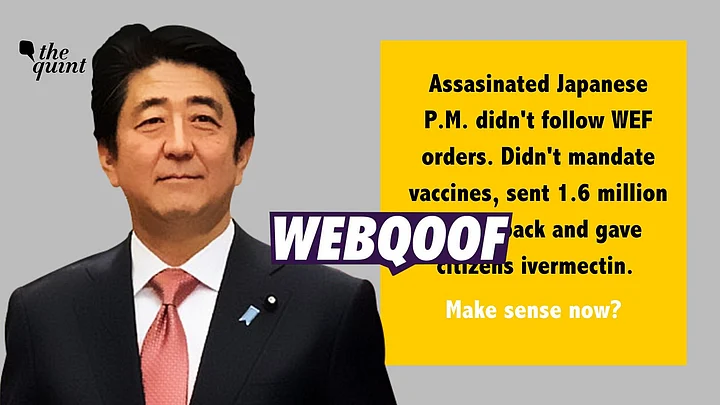Following the assassination of former Japanese Prime Minister Shinzo Abe on Friday, 8 July, social media users shared posts and graphics, claiming that Abe had been killed for his response to the COVID-19 pandemic in Japan.
The viral post reads, "Assasinated Japanese PM didn't follow WEF orders. Didn't mandate vaccines, sent 1.6 million doses back and gave citizens ivermectin. Make sense now? (sic.)"
However, the claim is false. The shooter, Yamagami Tetsuya confessed to the police that he shot at Abe since he held a grudge against the Unification Church in Japan, which he believed was popularised by the former prime minister.
Moreover, Abe had resigned as Japan's PM approximately six months before the nation began rolling out vaccines, hence could not have been assassinated for his policies on vaccination.
CLAIM
Text posts and graphics are being shared to claim that former Japanese PM Shinzo Abe was assassinated for refusing to follow the World Economic Forum's (WEF) plan to vaccinate people against the coronavirus, and opted to use ivermectin instead.
WHAT WE FOUND OUT
Police present at the site in Nara, Japan had immediately tackled the shooter, identified as 41-year-old Yamagami Tetsuya after Abe was fatally shot.
As per The Japan Times, Yamagami is a former Maritime Self-Defence Force member, whose mother was a member of the Unification Church of Japan.
Yamagami reportedly told the authorities that he held a grudge against the former prime minister – as he believed Abe had ties to the Church – since he had a problem with his mother being associated with the organisation.
The report elaborated that the shooter had "made up his mind to kill" Abe over a year ago, denying any political motivation, adding that he had initially planned on targeting a Unification Church leader.
Abe was Japan's prime minister for three terms, with his last term ending in 2020. In August 2020, he resigned from his prime ministerial position, citing health reasons.
JAPAN'S VACCINE ROLLOUT
As per Reuters, Japan began vaccinating its health workers in Tokyo with the Pfizer-BioNTech vaccine in February 2021, nearly six months after Shinzo Abe resigned as PM.
The vaccination programme began under the leadership of Abe's successor, former PM Yoshihide Suga.
Moreover, it is true that people in Japan were encouraged, but never mandated to take the vaccine, as per Japan's Ministry of Health, Labour and Welfare's website.
Further, as per the information available on the website of Japan's Pharmaceuticals and Medical Devices Agency, the government had not approved ivermectin as a treatment for the virus. A similar claim was viral in November 2021 and our fact-check can bee seen here.
Additionally, Japan had indeed suspended over 1.6 million doses of the Moderna vaccine in August 2021, but not because of an apprehension to vaccination.
The BBC reported that many vials of the vaccine were found to be contaminated with "black particles" in them, due to which the government suspended the entire batch that was received.
Clearly, there is no evidence to suggest that Abe was killed due to his response to the COVID-19 pandemic.
(Not convinced of a post or information you came across online and want it verified? Send us the details on WhatsApp at 9643651818, or e-mail it to us at webqoof@thequint.com and we'll fact-check it for you. You can also read all our fact-checked stories here.)
(At The Quint, we question everything. Play an active role in shaping our journalism by becoming a member today.)
